| RACING HISTORY |
YEAR: 1989
FEATURE RACE COMMENT
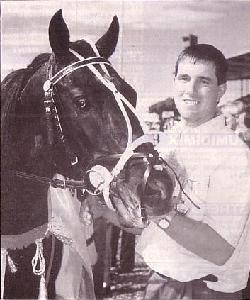 |
| Stable Foreman Hamish Molloy with Inky Lord |
A small handful of grit might have been the key to Inky Lord's dynamite performance to win the $400,000 DB Draught NZ Cup at Addington Raceway on Tuesday. Driver Ricky May arranged for a starters assistant to place the tiny stones in Inky Lord's mouth just before the start. He thought the grit would be a distraction while he was at the barrier and could make the difference between a good start and a poor one. "I've got Jimmy Curtin to thank for that wee secret," said May later.
It was national news on Friday that Inky Lord had failed to begin cleanly at the pre-cup trials on Thursday and any show Inky Lord had in the Cup depended on a safe start. This information was enough to put the breeze up the best of Inky Lord's admirers.
Curtin and May are good friends and as they walked around before the start of the first race on Cup Day, Curtin said to his mate: "Put some grit in his mouth just before the start. Nine out of ten have gone away when I've used it." May had tried the bribe on other horses, but had never before thought of using it with Inky Lord. "It gave him something to do at the barrier, but he was so settled and relaxed that I'm sure he would have begun well in any case. Brian spent about two hours with him on Saturday; he was just such a relaxed horse this time," he said.
May confessed that he was still in two minds after his Hannon Memorial success whether it was right to start such a young horse in the Cup, but he was also aware the horse was improving so much with each race.
At a "rough count", May puts his number of wins at 260. He has driven Inky Lord in every trial and every race - bar one, and that was in the Sapling Stakes when Kerry O'Reilly stood in during a term of suspension.
Had it not been for a dreadful check 450 metres from the finish, Inky Lord may not have won the Cup. Buried back in the pack, 12 lengths away from pacemaker Kylie's Hero, Inky Lord appeared to lose all chance when Debbie's Boy broke ahead of him after interference, and drifted back. Driver Ricky May saw the benefit of a brilliant beginning and a chance of winning the Cup fall apart. The situation appeared hopeless. "It just took me out of the race. I didn't have a dog's show when that happened," he said.
To Inky Lord's advantage, the gaps ahead had opened, but it was a matter of whether the little black grenade would have time to muster his usual explosive finish. Moving to the outside of the track, following the bold challenges being made by Bold Shavid and Dillon Dean, Inky Lord used speed and competitive spirit to join in the chase after Kylie's Hero.
By this stage, the second favourite was finding the last 50 metres uncomfortable, and Bold Sharvid passed him bravely. Dillon Dean, driven a treat by Colin De Filippi, then took over. But Inky Lord was still in full cry and five metres from the finish, the four-year-old had his head in front.
"When I started to catch Luxury Liner I thought there might be some of the money in it for us. And, then as we got closer to the finish I knew there was a chance we just might get up. It was a phenomenal sprint. I really thought Colin had it until those last 10 metres," said May.
Tony Herlihy, who drove the favourite Luxury Liner, said the backmarker went good and tried hard. "He just couldn't get a breather at any part."
"I thought to myself 'where'd the black fellow come from',"said James Stormont, who drove the third placegetter Bold Sharvid.
"I was confident he would see it out and he fought well. It was only in the last stride or two that he lost it, said Colin De Filippi, the driver of Dillon Dean. "I was pretty confident I had everything covered. I had forgotten about Inky Lord, because I knew he was behind me, and I didn't think anything would come from behind Dillon Dean and beat him."
Credit: Mike Grainger writing in HR Weekly
YEAR: 1989
FEATURE RACE COMMENT
 |
| Dillon Dean outfinises Inky Lord to win the 1989 NZ FFA |
Dillon Dean's win in the $100,000 Air New Zealand N Z Free-For-All could have been helped by trainer Don Dwyer standing closer to the winning post to watch the race. Well, at least Dwyer knew where his Shicker gelding had finished. "I got fooled in the Cup. I thought he had run third," Dwyer said, "but I didn't have any doubts today."
Dillon Dean's victory over Inky Lord was a total turn around from the DB Draught New Zealand Cup. Inky Lord had come from a 'mile' behind in the Cup, yet in the FFA the roles were reversed and Dillon Dean came off Inky Lord's back to win.
Dwyer now has a 100% record in the Free-For-All. His only other runner was Dillon Dean's half-brother Dillon Dale, who brilliantly won the coveted event in 1984. Ironically, Dillon Dale had run a placing in the Cup that year, running third to Camelot after losing a tonne of ground at the start.
Driver Colin De Filippi was full of admiration for the powerful pacer after the event. "He'd have to be the best horse I've driven," he said. "I was a little further back than I would have liked, but he just went when I asked him to," he said.
Credit: Harness Racing Weekly
YEAR: 1989
FEATURE RACE COMMENT
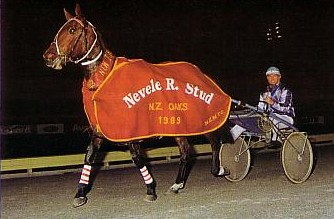 |
| Adina Bebe (John Hay) parades after the Oaks win. |
As far as the Nevele R Stud was concerned the scriptwriters couldn't have done it better. Locked in a desperate struggle at the end of the Nevele R-sponsored New Zealand Oaks were Adina Bebe and Looks The Part, both first crop daughters of the stud sire, Nero's B B.
But had Looks The Part closed the gap on first and second by a nose and a short neck the result would have been rewarding for one of the stud's key figures. Looks The Part is race by Wayne Francis, the principal with Bob McArdle in the Nevele R Stud. Being the breeder of the horse, he would have gained a $100,000 bonus payment; as it was the bonus went to Lloyd Ashby and his brother-in-law Brian O'Meara.
Adina Bebe was superbly driven in a marvellous race run in record time by John Hay. She was in the last handful approaching the 1000 metres but made good headway in the line following Happy Hazel; this included Joy's Girl and Adrenalin. Near the 500 metres, Adrenalin started to give way, drifted in, and Hay found Adina Bebe still well in the chase. Passing Joy's Girl, Adina Bebe soon had Happy Hazel in her sights. Happy Hazel, so gallant, had been in every attack, but was she ready for this? Before the post and after the post, Happy Hazel was in front; on the line, the nose belonged to Adina Bebe. Right alongside and only a short neck beck was Looks The Part, the veteran of only two starts who tracked Adina Bebe into the last 400 metres.
Lloyd Ashby, who races the filly in partnership with his wife Patricia, is a former All Black fullback. He bred Adina Bebe after her dam Gaelic Nurse (by Smooth Hanover from Nurse Lea, by Van Hanover) was advertised in the "Trotting Calendar" for $1300. "Brian picked her out for me. She apparently only had one start, but also finished second in a trial to Trusty Scott," said Lloyd. Bought off Robert Crooks, Gaelic Nurse went to Sholty Imp - leaving Sir Anlon, who Hay trained to win a race - then left Adina Bebe to Nero's B B. "It was a calculated gamble going to such an unproven sire," he said.
For a start, Adina Bebe was placed in a professional stable, but she became a problem horse and didn't make the progress Lloyd hoped she would. "It was one of those things. She's just a horse who needs a bit of time spent on her, and sometimes it's hard to give them that," he said. After making a winning debut and qualifying for the DB Fillies Final with a 1:58.4 placing at Ashburton, Adina Bebe went through patchy form. "You may think it's a bit odd me saying this, but I still think she is a race short. She had a little setback and a wee spell, but the funny thing was that nothing showed up in her blood," he said. Lloyd paid tribute to Brian O'Meara for the knowledge and advice as he fine-tuned Adina Bebe in the few weeks leading up to the Oaks.
Credit: Mike Grainger writing in HR Weekly
YEAR: 1988
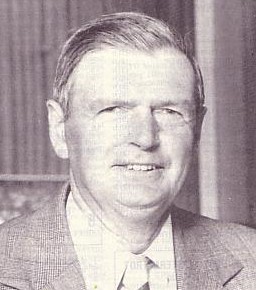 |
Harness racing lost a good friend with the sudden death last week of Mr Les Woods. Aged 66, Mr Woods died on Thursday morning at his Halswell home in Christchurch.
Mr Woods was elected to the NZ Trotting Conference in 1979, being heavily involved in the cadet scheme, the equine research foundation, and standing in for a few months as Conference treasurer.
A Justice of the Peace, Mr Woods was a past President of the Banks Peninsula Trotting Club, has served as an appeal judge on Conference tribunals, was president of the national association of rodeo riders, and for many years held office on the local county council.
Mr Woods was a retired Motukarara farmer who bred most of the horses he raced, among them That's Incredible, Seltreb, Madam Holiday, Fly Boyden Fly, Trebles, Master Jim and Ashwood King.
He is survived by his wife Margaret, a son and three daughters.
Credit: HRWeekly 10Feb88
YEAR: 1988
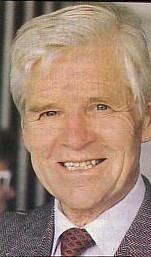 |
Besides being his first, Argentina's win at the Manawatu meeting last week might also mark a notable last.
It gave prominent owner, breeder and occasional driver Roy McKenzie his third winning drive for the season. And as Roy retires from racing this season now that he has turned 65, the win behind Argentina could be the last of his career. He doesn't see many more opportunities for himself on the track, other than the two-day Wellington meeting over Queen's Birthday weekend.
If there is another win to come, it will mean he will egual his best for the season, when he won four with Arania Scott. Roy has been driving for 33 years.
Since driving Scottish Command to win a 3-year-old race at Hutt Park - "it was the only time I drove him" - he reckons on having driven about 50 winners. "I only drove the lower end of the team. It keeps your hand in and I particularly liked the trotters," he said. He drove at Addington's Easter meeting some years ago, finishing fourth with Highland Countess in the NZ Trotting Stakes,
Credit: Mike Grainger writing in HRWeekly 7Apr88
YEAR: 1988
BUILDINGS & FACILITIES
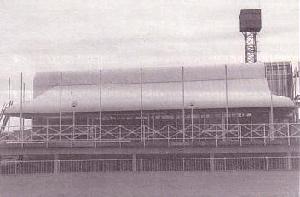 |
The Pavillion opened at the Canterbury Park TC's meeting on October 5, 1988.
The Pavillion replaced the marquee at the top of the straight, which had been used for the previous three years by sponsors and firms. The marquee had proved extremely popular, but strong winds had caused such damage that a permanent construction was necessary.
"The new variety is most impressive," said Trevor Davis, the Secretary-Manager of Addington Raceway. "Two walls are made completely of glass, so people don't have to go out onto the platform to watch a race. It has facilities that are designed for the function market. It can be hired out, just like Twiggers," he said.
The first sponsor to hire The Pavilion was the Merivale Mall.
Credit: NZ HRWeekly 5Oct88
YEAR: 1988
PRESIDENTS: NZMTC
 |
E C Powell writing in NZ Trotting Calendar 29May57
What manner of man is the president-elect of the NZ Trotting Conference, Mr Charles Stewart Thomas, retired barrister and solicitor of the headquarters of trotting, Christchurch? Is he sagacious? Is he juridical? Is he energetic? Does he know trotting? Has he contributed more than most men to the sport of trotting? Is he a hail-fellow-well-met? Has he the manner to foregather with the high and the lowly? Has he courage to face and deal with any issue? Has he ideas for the future conduct of trotting? Has he business capacity? Has he earned respect among his fellows?
To each and every question relating to C S Thomas, the answer can be faithfully and sincerely given in the affirmative.
The sport may consider itself fortunate that now that he has retired after 41 years of tremendous pressure in his legal capacity and on the rewards he fully earned, Charles Thomas has, after 18 months of retirement, accepted nomination for the presidency of the Conference. That he has not been opposed by a nomination from any club in the country is a ready-made and unsolicited testimonial to him.
If any person should know Mr Thomas, I should. It was a small boy, 9in shorter than I am now, and in short pants, that I became his message boy well nigh 40 years ago. What manner of man is he? After one week in his office, he called me in and said: "Powell, you appear to be an honest boy. Here are the keys. Open up the office, the strongroom and all the boxes in the morning." And when I went to a newspaper office, of which he was a director, to make a hestitating step into journalism, he gave me a recommendation when E C Huie, managing-editor of 'The Sun' telephoned him. We have been friends ever since.
"Now I'll be able to give my time to my outside interests, which I have wanted to do for so many years," he told me when he walked out of the office of one of the most prosperous legal businesses in NZ at Chrismas 1955. He had built up the business by sheer grinding work, plus uncommon ability. He was not only a great advocate - perhaps in his early days, second only to Alfred Charles Hanlon, KC of Dunedin - but a highly skilled practitioner in ever branch of law. As his practice grew, so did he grow. In both criminal and civil law cases, he was notably successful. Always a fighter, he advised his clients on many occasions to go to appeal. And he lost only two cases he took to the Court of Appeal - an institution where judges themselves argue with the brothers as well as with counsel to get views and law to solve the knottiest of legal problems. But before to much - and it be well said critically too little, because of space - is said about the career of Mr Thomas at the bar and in his office in Hereford Street - let us examine his record as a man, a sportsman.
What has he done for trotting?
Without doubt, the greatest thing he has done for trotting, also racing, and the general sporting public of NZ was to devise the TAB scheme now operating so successfully. When the Royal Commission on Gaming and Racing toured the country, he accompanied it as counsel for the Trotting Conference. The bookmakers - pardon, the Sportsmen's Association - made a strong case foe their licensing. He had the answer. He had prepared the off-course betting system now known as the TAB, and which has greatly benefitted the clubs and the sports of trotting and racing and has given considerable satisfaction to the public.
The Commission accepted the scheme. It operates today almost in the form in which it was planned by Mr Thomas. It is not a perfect scheme yet. The time lags between investments and races is far too long. 'This and the next' has not been introduced. Doubles on races on different days, such as the NZ Cup and the Trotting Cup, are not provided. The punter with funds from a winning bet cannot operate on those funds on a Saturday.
If one immediate good result will arise from his election to the presidency of the Trotting Conference, it is that he will be chairman of the Board of the TAB every alternate year by virtue of his office. And being a sporting man, I will now lay anybody the price of one flagon of beer that Mr Thomas, as a member of the TAB Board and every second year as chairman, will work with a will to expand the scheme, to the satisfaction of both clubs and sportsmen. His ideas did not run out when he propounded a workable off-course betting scheme.
And as its president for seven years the NZ Metropolitan Trotting Club made notable advances when he was in office. Everything he did aimed to popularise trotting. Addington had its hey-days when he was president. Although a Scot, he has none of the nationalistic cautiousness. He believes that a day at the trots should be a gala event, with flags flying everywhere, bands playing, pipers blowing hard, the crowd having enjoyment and the best-class of horses racing.
He has raced two pacers, Scholarship and Oxford Scholar. His partner was Mr Allan Matson, a former president of the Conference, and they were a happy pair, whether Scholarship won or petered out after clearing to the front with a round to go. But it was not as an owner but as an administrator that Mr Thomas contributed so much to trotting. As in his profession of law, he had boundless energy. He also had the natural gift to grasp facts, to weigh them as a judge would, to give wise judgement, fair and honest. Although his bag was loaded with briefs for the defence of accused men or for claims amonting to thousands, he would be at Addington during the week any time he was called on to give his opinion or decision. He was a distinguished president of the Metropolitan club.
As a lawyer, he has appeared in many cases as counsel for the Trotting Conference (and the former Association) and his judicial capacity has been recognised by the Racing Conference appointing him as an appeal judge. Learned in the law, he is also learned in the ways of men. A case which created Dominion-wide interest in which he appeared was that in the Supreme Court at Dunedin to determine the ownership of that good galloper, Queen of Song, who won the Wellington Cup, and the Riverton Cup and the Great Autumn Handicap within four days, and races in Australia.
So when the Conference faces the revision of the rules it will be fortunate in having him as its president. And when it comes to the carrying out of those rules, or interpretation of the existing rules, he will doubtless bring to bear his profound knowledge, his anxiety for the protection of the accused and for the complete presentation of the case for and against, and, last and above all, that justice be done to all. To his high office, he will also bring his business acumen. He has also the distinction of being the only lawyer in NZ to be retained as sole counsel for insurance companies in any one centre to handle all cases for the 'insurance pool' which grew into a business of magnitude. Many compliments were paid by counsel for claimants on his conduct when cases reached the courts or were settled by negotiation. He was a director of several companies and when he was in law, running his own office was itself no small undertaking.
His sporting activities have not been confined to trotting. He was a notable athlete in his younger days. He was for two years senior athletic champion of Christ's College, was in the college first fifteen in rugby and in the eights for shooting and gymnastics. He was a Canterbury champion for all distances from 100 yards to one mile and just before the outbreak of World War I he represented NZ at the British and Scottish athletic championships. For years he was a boxing judge and also a member of the Canterbury Swimming Centre. He was official starter at athletic meetings for many years.
Probably without comparison in NZ for the holding of an office is his presidency of the Canterbury Caledonian Society. He has been president for 42 years and his driving force was responsible for the building many years ago now, of the Caledonian Hall in Kilmore Street. He founded, and is still patron of, the NZ Pipe Bands' and Pipers' and Dancers' Associations. He introduced the pipes to Addington, and a meeting without the skirling would sound strangely quiet and commercial.
Already established as a pleader, Mr Thomas was counsel for Whitta, a Christchurch tobacconist, who about 1919 or 1920, was charged with carrying on the business of a bookmaker. The case had national interest, because a number of men who had wagered with Whitta, and they included a bank clerk and others in all walks of life, were also placed on trial. The senior counsel was the late Mr Saul Soloman, KC of Dunedin. Whitta was found guilty and imprisoned and spent his last days in Sydney. The Whitta case appears for all time in the law journalsas the law on bookmaking.
The Whitta case went to trial some years after Mr Thomas had taken his first case in the Supreme Court. His client was an Australian pickpocket, named Walker - pickpockets and confidence men were frequently before the Courts in those days - who arrived in NZ with a few shillings in his pocket and had £4000 in the bank on the day at the Riccarton races, when a punter, feeling a hand in his hip pocket, seized the intruding wrist. The wrist was Walker's. The fee for the defence was agreed on and Walker sportingly offered to double it if Mr Thomas secured his acquittal. The jury had no hesitation in finding Walker guilty, but the pickpocket was so happy with the case put up for him - "You are better than I thought you would be," he told his counsel - that he paid the double fee before he went to Lyttelton gaol.
Of the numerous persons on murder charges for whom Mr Thomas appeared, only one was convicted on the major charge. And then Mr Thomas, by assiduous work, saved him from the gallows. He was Matthews, who shot a constable at Timaru. Because of Matthews's well-known connections in Invercargill, Matthews's total disregard for human life and the insanity plea advanced by Mr Thomas, the trial created tremendous interest throughout NZ. It goes down in crime annals, Mr Thomas was convinced that Matthews was insane. When Matthews was found guilty, his counsel immediately appealed to the Executive Council, which decides whether the death penalty shall be carried out, a commission was set up and the finding was that Matthews was insane. Matthews was mad. He twice escaped from Seacliffe Mental Hospital and even 35 years ago his mental condition had deteriorated gravely. I believe he is still in the hospital, guarded 24 hours of the day.
Then there was the famous case of a murder charge against a man named Boakes, a taxi-driver of Christchurch, the alleged victim being a girl. She was found dead at Burwood. Mr Thomas secured his acquittal. He was also successful some years later in his defence of a man named Mayo, charged with murdering a man with poisoned chocolates. Perhaps the greatest criminal case in which he appeared was that of a charge of murder against a man named Mouatt. The allegation was that Mouatt had dismembered his wife at their St Martins home and destroyed the bones in the grate. Mouatt was found guilty of manslaughter and sentanced to a long term of imprisonment. On his release, he called at Mr Thomas's office to collect several wooden statues which he had left with his lawyer but did not call on his counsel. Mr Thomas has not seen Mr Mouatt or heard of him to this day. Mr Thomas maintains that the bones produced at the trial were not those of Mrs Mouatt and that Mouatt could not have destroyed the bones in a grate.
All these cases entailed laborious research and days of study. Mr Thomas has given to all his other activities the same diligence and thoroughness. After nearly 60 days of evidence, he worked day and night preparing his case for the insurance companies in the celebrated Ballantyne fire inquiry - 41 perished - of nine years ago. It took him three days to present his submissions. His work was a feature of the inquiry. He worried about the fee he should charge. He had no need to. He had earned every penny.
This is the man, who in August, will become the head of the trotting sport in NZ. To clubs, officials, trainers, drivers, owners and the public, I must say, in the words of Tommy Trinder, "You lucky people."
-o0o-
Harness Racing lost a figurehead with the death in Christchurch last week of Mr Charles Stewart Thomas. One of the great administrators of his time, Mr Thomas was 99. He was a notable criminal lawyer, an excellent athlete who represented NZ, and a devoted supporter of harness racing.
He was elected to the committee of the NZ Metropolitan Trotting Cup in 1938, and became vice-president from 1940 to 1945. He was president of the club from 1945 to 1952. From 1952 to 1970, Mr Thomas served as treasurer of the club. In 1957, as president of the NZ Trotting Conference, he proposed a plan for off-course betting before the Royal Commission on Gambling and Racing. This was later adopted by the Commission as the concept for today's Totalisator Agency Board.
One of those who knew Mr Thomas well was Mr Des Parker, Secretary of the Metropolitan club from 1951 to 1979. "He contributed a lot to trotting; he was deeply involved," said Mr Parker. "He was a fine man. You just couldn't fault him. He was a very strong member of the team for a long time," he said. Mr Thomas was elected a life member of the Metropolitan club in 1952 on his retirement from presidency. He was the 32nd life member of the club; the first being Mr H Mace in 1901.
As an owner, Mr Thomas raced the good pacer Scholarship in partnership with Mr Allan Matson. A son of Grattan Loyal and Oxford Queen, Scholarship won seven races in the late 1940's, firstly from Dick Humphrey's stables, then while trained by E Rinaldi and W J Coates and driven by Wes Butt. His last win was in the Hornby Handicap on Show Day at Addington in 1948 when he defeated Lady Averil and Commander Scott. Highland Fling, Chamfer, Captain Sandy and Gay Piper were other winners that day.
-o0o-
Under the heading of “Athletics” in the NZ REFEREE of 19th August 1914 it was reported that
“C S Thomas, the Dominion half-mile champion, ran third in his heat in the A A A Championships at Stamford Bridge when, by breaking the standard time, he won a bronze medal.”
NZMTC: Historical Notes compiled by D C Parker
Credit: HRWeekly 13Apr88
YEAR: 1988
JUDGES
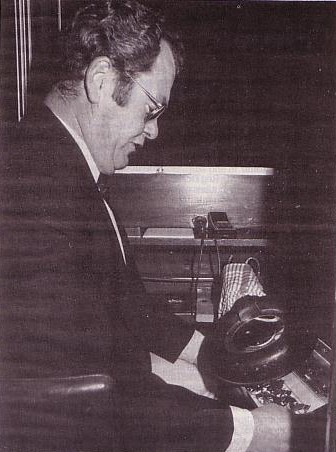 |
Don't think Judge Geoff Bruhns gets it easy on racenights at Addington. He will say that his time in the judge's box can be most demanding.
Arriving on-course at least an hour before the first race, the former Prne Gould Guiness deer representative begins his routine by marking the scratchings in his racebook. Geoff then goes up to the judge's box situated at the southern end of the steward's stand and runs through the names of the night's 10 races, in case of any tricky pronunciations. Geoff also checks his Tridex intercom system - which he uses for contacting Totalisator Control and the semaphore board - and his video equipment. After a meal in "Twiggers" with either his assistant Ernie Fuchs or commentator Reon Murtha, Geoff's time for quick but deadly accurate decision-making begins.
Geoff, Ernie and the other assistant, Brent Tweedie, watch each race intently, during which Ernie activates the lap bell from a small switch underneath their wooden bench. As the horses cross the finishing line, Geoff notes down the numbers of the first five home. If it's close for any placing, he replays the last 10 metres on the television between his feet, as a check for his visual call only. If a horse's number is obscured, Geoff will use the trainer's colours to determine what horses are in the call. "While Reon is still talking I call for a photo for first, and any other placing that warrants it," Geoff says. By "call" he means he speaks through a hole in the metal pipe that connects the judge's box with the photographer's room. The photographer acknowledges, and within seconds the required prints are sent down through that pipe.
Just before Geoff announces his initial call to the public, he radios that call through to both the semaphore board and tote control - hence the preliminary dividends that appear on the televisions moments after the race. Confirming his judgement by use of the photos, Geoff relays them, as well as the margins he quickly works out, live on-course.
"I always ask for a photo for first because off that I can work out the time using a lined grid," he said. "When the first horse hits the finishing line it breaks a laser beam which stops the timing of the race. The photos of the first four placings have a decreasing scale of time running across the top of them, and from the photos we can determine each individual time by lining them up with the scale," he said.
During this time, Brent has determined the finishing order of the whole field, not an easy task by any means. Geoff can check this if need be from a 25cm-long strip which most of the time contains the whole field. The strip is in minute form, but he has a lighted madnifying glass at his disposal as well.
After every detail is decided, Geoff goes to the office in the drivers' room and writes the first five placings in the club's official book. "I always place one more horse than a stake is paid to, just in case of a disqualification. If everything goes smoothly, I can have up to 20 minutes to fill in between races, but that doesn't happen often," he said.
Geoff, who will be starting his fifth year as judge at Addington next month, has also been the Riccarton judge for over 10 years. "I judge on colours at Riccarton because I know them better there, I work by numbers at Addington. And the only other difference is that I have to placethe first six home at Riccarton," he said.
Geoff used to be part of a 10-strong syndicate that raced the pacer Money Order. Because it is illegal to have ownership in a horse in such a position, Geoff pulled out of the syndicate a month before he took over at Addington. Money Order won it's one and only race just two months later.
Credit: John Robinson writing in HRWeekly 20Jul88
YEAR: 1988
PEOPLE
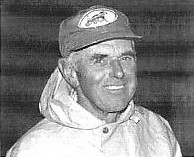 |
Jack Andrew Carmichael, who retires this season from driving, was born in Wanganui 65 years ago. His father Andrew and brother Alf were freezing workers who trained horses they owned themselves. Among their winners when Jack was a boy were Kraal, Harvest Boy and Silver Black (later trained in Hamilton).
In 1939, Jack went to the Exhibition at Wellington. With £60 in his pocket from shearing, he was "well off". "It was a hell of a lot in those days," he said. He carried on to Christchurch, where he got lodgings with Dave Bennett and a job working in the stable of Wes Butt. "I was there for twelve years. I used to ride Mankind in his saddle work, and rode him when he ran second to Gold Bar at Addington in 2:4.
"In those days we did a lot of travelling, all by train. It was nothing for us to take 12 to 14 horses to the Coast. But travel was cheap then, and the meals and board didn't seem to cost anything. You'd find, too, that all the owners would be there to watch them race," he said. His first success came with Dawn Grattan at the Westland Trotting Club's meeting on March 21, 1942, and a significant win in that period was taking the Greymouth Cup with Direct Medium.
After marrying Dorothy, Jack bought a farm, where he grew potatoes, then raised pigs and milked 30 cows. He liked the farming life, but agreed to train Coronet Lass and Monopat (dam of Micron and bred by Des Grice) for Ted Graham. Two horses soon became four and then a team, with Tekapo Queen, Gold Globe (by Johnny Globe)who won six races in the early 60s, followed by Dorstan, Bonny Rachel, Rocky Star, Chequer Board, Hindu Star, Precocious, Globe Bay and Worth Seein'.
"Precocious was a great old stayer - she'd just keep going, but I think Globe Bay was the best I had. He was a lot better than what people thought. He was a very nervy horse and early on he was stood down for breaking in a race. He was always a bit funny when he looked like being squeezed up and his form leading up to the Cup, the year he won, was a bit patchy. Rauka Lad was the horse they were writing up. I remember there was a bit of a skirmish up front with a round to go. I had to pull him down to the inside and then take him back out. Any other time he would have broken, but this time he just cruised round. He was always going well," he said.
His one regret as a trainer was losing Worth Seein', a daughter of Johnny Globe and Fifth Brigade, the dam of Berkleigh. She got to c4 and then went down with a liver complaint and died. She would have been a top trotter," he said.
For many years Jack was on the committee of the Trainers and Drivers Association and was there during the campaign for a losing driving fee. The trainer of 330 winners has noticed a change of driving standards and tactics over the years. "It used to be a bit easier because you'd be driving against the same fellows. There are a lot of different ones against you now, and there is a lot of different types of driving," he said.
Jack has also noticed a change in the style of training. There was a time, he recalled, when there would be no rush to investigate the speed of the yearlings and 2-year-olds. "It's not a bad thing, starting on the young ones earlier, but I still think waiting for them would be better. I know with Micron we didn't do much with him until he was four and he just about went straight through to Cup class," he said. "I'm inclined to think there is too much emphasis placed on 2-year-old racing. People still like to see the older horses, like Lord Module and Robalan race. They like the name horses," he said.
With the game nearly up, Jack intends to keep training for another 12 months. "I might retire then. I don't know if I want to keep training horses," he said. Like most others in his era, Jack used to admire Maurice Holmes when he was on the track, but has detected a slip in such considerations in recent times. "Life's changed. The younger ones used to look up to the older ones; nowdays they wouldn't give two hoots," he said.
-o0o-
Jack Carmichael was No.1 driver for Prebbleton trainer Des Grice ever since Bob Young died. "He has always been a very competent horseman," said Grice. "I think he's one of the best tactical drivers in the country. He would be in the same class as Maurice Holmes and Bob Young. The biggest problem was getting the information out of him after the race; he was good the next day," he said.
Credit: Mike Grainger writing in HRWeekly 13Jul88
YEAR: 1988
PEOPLE
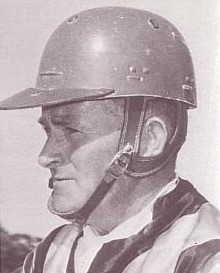 |
Memories of Dominion Handicaps run over 60 years will flood back for the now 78-year-old Harold "Chappy" Fisken when on Saturday night he sits at his home at Pukekohe, watching on TV the 77th running of this prestigious event.
Many outstanding trotters have won this time-honoured feature, but few among them would measure up to the mighty American-bred horse Peterwah, raced, trained and driven by "Chappy's" father, the late Robert Fisken, to win in 1926 from 72 yards behind. The Dominion was run the same day as the NZ Cup that year, and, according to newspaper reports of that meeting, although the Cup winner Ahuriri was repeating his victory of the year before, the large crowd was ever bit as generous with its applause of Peterwah's outstanding success.
Bob Fisken - all the way from Gisborne - had become a star harness horseman on the NZ scene. On earlier southern forays, he had won the 1921 Dominion Handicap with Wild Lad and the 1924 NZ Trotting Stakes at Forbury Park with Peterwah, while in 1927 he was to win the NZ Sapling Stakes at Ashburton with Petewah's daughter Enawah.
As he recalls those halcyon days when he was just a lad, a sparkle returns to "Chappys" eyes. It is typical of the man that he retains his zest for living, despite the loss of his son David in an auto accident in Mexico about eight years ago, a stroke then rendered him almost totally paralysed 18 months ago and the death of his wife earlier this year.
As he shuffles on a stick around the silos, crushing machines and conveyor belts of the thriving animal food processing plant that has been his primary vocation for a good many years, he quips: "You'd never think I was for three years Poverty Bay and Hawkes Bay champion runner over a mile and three miles, would you? But I'm coming right; you should have seen me a while ago. I guess I haven't got much more time to go, but I'll get better before I get worse," he insists, adding: "I haven't had a licence to drive a car for a few years, but I've still got my trotting trainer's licence. I've got a couple of old nags out there in the paddock, and I'm causing a bit of havoc threatening to put them back in work." The "nags" are the trotting geldings Zakariah (winner of 6 and now noe 14) and Go Hi (a now-white13-year-old with two wins to his credit).
"Chappy's" father, greatly successful as a stock agent and meat exporter and uncrowned king of the trotting sport at its peak in Poverty Bay, was ruined by the Great Depression of the 1930's. That experience made "Chappy" ever careful not to let his love of horses undermine more reliable means of survival. From small beginnings, he built his food-supply business at Pukekohe into one that last year topped $8 million in sales. "Not bad for an operation with a staff of six and no sign on the gate," he proudly observes. "That figure could be much higher, but you can get too big and go under. We just service Pukekohe and Takanini in the main - it's all I want to handle." "Chappy's"interest in harness racing these days is mainly in the process of Iwanago, a useful Nat Lobell four-year-old pacer being prepared at the Pukekohe centre by his son-in-law Barry Lockyer (formerly associated with the outstanding trotter Highland Flight).
Robert Fisken was a legend in his time in the days when Poverty Bay was one of NZ's strongest trotting strongholds and produced another great horseman in Tom Roe, winner of the 1920 Dominion Handicap with Gold Boy. Fisken fought hard to offset his area's isolation by subsidising by 50% the return rail fares for horses from around NZ to entice them to his local meetings. "Bill Lowe used to come from as far away as Ashburton recalls "Chappy". At one of the last Poverty Bay meetings, in 1926, he had Trampfast (who was to win the Dominion Handicap in 1934) and the pacer Carbine Direct both in the Poverty Bay Cup. Dad drove Carbine Direct for him, and won it, while Trampfast was unplaced."
"Chappy" was 11 when in 1921 his father won his first Dominion Handicap with Wild Lad. A gelding from the Wildwood horse Wildmoor from a Rothschild mare Miss Vera, he came off 12 yards to bolt in by six lengths. The following year, Bob Fisken accompanied Free Holmes and J D Piper to America in search of standardbred speed. Holmes' acquistions on that trip were Estella Amos (who left champion pacer Indianapolis and outstanding matron Tondeleyo) and Rey de Oro (who became a three-time champion NZ sire).
Fisken secured as yearlings Peterwah and Real Guy, the pair costing him a total of £500 landed in Gisborne. Re-sold to Albert Hendricksen, Real Guy, a Guy Axworthy horse, raced only twice, winning one of those starts at Auckland, before siring 69 winners and also becoming a successful broodmare sire.
Peterwah was by Etawah, in his time champion world two-year-old trotting colt with a 2:19½ mark on the half-mile, and Transylvania winner at four in a world record for three heats of 2:03¼, 2:03½, and 2:03½. Janeva, the dam of Peterwah, was by the immortal progenitor Peter The Great. Over 11 seasons, Peterwah had 12 wins between Auckland and Dunedin. In winning the 1928 August Handicap at Addington from 24 yards behind he beat a capacity field of good-class pacers in 4:23 4/5, a world trotting mark for two miles from a stand. Hailed at this point as the greatest trotter NZ had seen, he was the last of his gait before Scotch Tar (1982) to contest the NZ Cup, finishing unplaced in the 1828 event.
Peterwah once won from 228 yards behind at a Poverty Bay meeting. "He was handicapped out of trotting races, and had to compete against the best pacers," recalls "Chappy". Mixing his racing with limited stud opportunities before his owner was forced to sell him with the bulk of his big string of horses to Australia, Peterwah sired 22 NZ winners and a further 21 in Australia. One of these was Enawah, who added 11 other victories to her Sapling Stakes win. Another, Captain Bolt, became "Chappy's" first good horse, winning him four races before being sold to Mrs E A Berryman and becoming an even bigger success under Cecil Donald.
On moving to Rotorua and marrying, "Chappy" gave trotting away for long years, breaking 180 acres into a sheep and cattle farm, and freeholding a plush house on five acres overlooking the lake. "When someone gave me £6000 for it in the 50s, I thought I was made," he said. "It was re-sold for £65,000 and then £102,000 before we changed to dollars and I suppose it would be worth something like half a million dollars now."
One of the horses bought by Hawera trotting stalwart Alex Corrigan when the Fiskens sold up was Robert Earl. This son of Wrack and the Logan Pointer mare Ivy Pointer became a successful sire; and a free service given to him by Corrigan bought "Chappy" back into the sport. "I can't remember what the horse was that I bred, but I was into it again, and since then have always pottered around with a horse or two," he says. Apart from Zakariah, "Chappy's" best winners have included trotters Final Star, Five Star and Pukepoto and pacer Faux Pas. "I even got to Addington once, when I took a trotter Knighthood that I trained for an old bloke up this way after winning at Hutt Park with him; but we didn't get any money down there," he said.
"I reckon, however, that I made it a a sire. My son David, about four years before he was killed, finished 10th in the Boston Marathon." The trophy to mark that worthy accomplishment by David takes pride of place over everything else in the Fisken household.
Credit: Ron Bisman writing in HRWeekly 16Nov88
| << PREVIOUS | 1 2 3 4 5 6 7 8 9 10 11 12 13 14 15 16 17 18 19 20 21 22 23 24 25 26 27 28 29 30 31 32 33 34 35 36 37 38 39 40 41 42 43 44 45 46 47 48 49 50 51 52 53 54 55 56 57 58 59 60 61 62 63 64 65 66 67 68 69 70 71 72 73 74 75 76 77 78 79 80 81 82 83 84 85 86 87 | NEXT >> |